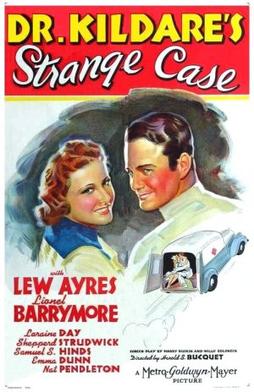Dr. Kildare's Strange Case
Dr. Kildare's Strange Case is a 1940 American film directed by Harold S. Bucquet. This film is part of the Dr. Kildare series, which was based on the fictional character created by author Max Brand. The series follows the life and work of Dr. James Kildare, played by Lew Ayres, a young and idealistic physician who is mentored by the seasoned and wise Dr. Leonard Gillespie, portrayed by Lionel Barrymore. "Dr. Kildare's Strange Case" is notable for its exploration of medical ethics and the challenges faced by medical professionals.
Plot[edit | edit source]
The story revolves around Dr. Kildare's attempt to cure a young man suffering from a rare psychosomatic disorder. The patient, suffering from blindness, is believed to have no physiological reason for his condition, leading Dr. Kildare to explore psychological solutions. This approach, however, puts him at odds with the hospital administration and his mentor, Dr. Gillespie, who are skeptical of Kildare's unorthodox methods. The film delves into themes of medical experimentation, the doctor-patient relationship, and the pursuit of new medical discoveries.
Cast[edit | edit source]
- Lew Ayres as Dr. James Kildare
- Lionel Barrymore as Dr. Leonard Gillespie
- Laraine Day as Nurse Mary Lamont
- Shepperd Strudwick as the patient, suffering from psychosomatic blindness
- Other supporting cast members include characters who work at the hospital or are connected to the main patient's case.
Production[edit | edit source]
Directed by Harold S. Bucquet, "Dr. Kildare's Strange Case" was produced by Metro-Goldwyn-Mayer (MGM), a major player in the film industry at the time. The film is a part of the larger Dr. Kildare series, which was popular in the late 1930s and early 1940s. The series itself was adapted from the writings of Max Brand, with each installment focusing on different medical dilemmas and personal dramas surrounding Dr. Kildare and his colleagues.
Reception[edit | edit source]
Upon its release, "Dr. Kildare's Strange Case" was well-received by audiences for its engaging plot and the performances of its lead actors, particularly Lew Ayres and Lionel Barrymore. The film contributed to the ongoing popularity of the Dr. Kildare series, which included both movies and later, a television adaptation. Critics praised the film for its exploration of psychological aspects of medicine, a topic that was relatively novel in cinema at the time.
Legacy[edit | edit source]
The Dr. Kildare series, including "Dr. Kildare's Strange Case," played a significant role in shaping the medical drama genre in both film and television. The series is credited with introducing audiences to the complexities of the medical profession, including the ethical dilemmas and emotional challenges faced by physicians. The character of Dr. Kildare has become an iconic figure in American pop culture, representing the idealistic, dedicated doctor committed to his patients' well-being.
Navigation: Wellness - Encyclopedia - Health topics - Disease Index - Drugs - World Directory - Gray's Anatomy - Keto diet - Recipes
Search WikiMD
Ad.Tired of being Overweight? Try W8MD's physician weight loss program.
Semaglutide (Ozempic / Wegovy and Tirzepatide (Mounjaro / Zepbound) available.
Advertise on WikiMD
WikiMD is not a substitute for professional medical advice. See full disclaimer.
Credits:Most images are courtesy of Wikimedia commons, and templates Wikipedia, licensed under CC BY SA or similar.Contributors: Prab R. Tumpati, MD

